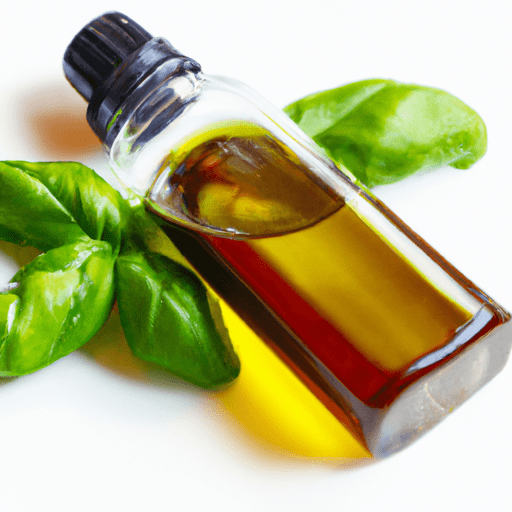The Delightful Elixir: Basil Infused Oil
If there’s one ingredient that can elevate your dishes to new heights, it’s basil infused oil. This flavorful elixir combines the vibrant essence of fresh basil with the richness of high-quality oil, resulting in a culinary wonder that can transform even the simplest of recipes. In this blog post, we’ll delve into the world of basil infused oil, unravel its tantalizing taste, explore its versatile uses in cooking, highlight its nutritional value, and uncover some fascinating history and facts about this culinary gem.
Unleashing the Taste Sensation
Basil infused oil carries an enchanting flavor profile that showcases the herb’s sweet, peppery, and slightly minty notes. The oil captures the essence of fresh basil leaves in a concentrated form, adding brightness and depth to any dish it graces. Whether drizzled over a Caprese salad, used as a dip for crusty bread, or incorporated into sauces and dressings, basil infused oil lends a savory, herbaceous twist that turns ordinary meals into extraordinary culinary experiences.
Versatile and Exquisite Uses in Cooking
The potential uses for basil infused oil in your kitchen are truly endless. Just a touch of this aromatic oil can elevate a wide range of dishes, showcasing its remarkable versatility. Here are some delightful ways to incorporate basil oil into your culinary repertoire:
1. Salads:
Drizzle a bit of basil infused oil over fresh garden salads or mix it into homemade salad dressings for an instant burst of freshness and fragrance.
2. Pasta:
Stir a spoonful of this oil into your cooked pasta for a quick and tantalizing sauce. Add some roasted vegetables, grated Parmesan, and a sprinkle of crushed red pepper flakes for a delightful meal.
3. Grilled Vegetables:
Brushing grilled vegetables with basil infused oil can transform them from ordinary to extraordinary. The oil’s herbaceous notes perfectly complement the smoky flavors of grilled peppers, zucchini, and eggplant.
4. Marinades:
Use basil oil as a base for marinades, infusing your favorite proteins with its irresistible taste. Whether marinating chicken, tofu, or seafood, this oil works wonders in enhancing the overall flavor profile.
5. Dips and Spreads:
Create delicious dips and spreads by combining basil infused oil with ingredients like garlic, lemon juice, and Parmesan cheese. Serve with freshly baked bread or use as a condiment for sandwiches and wraps.
Nutritional Value and Wellness
Apart from its delectable taste, basil infused oil also offers certain nutritional benefits. Basil itself is known to be a good source of vitamins A and K, as well as iron and antioxidants. When the basil flavor combines with the beneficial properties of oils like olive or avocado, the resulting infusion becomes a powerhouse of health benefits.
Moreover, basil infused oil can be a great alternative to heavier dressings and sauces, reducing the caloric content of your dishes without compromising on flavor. Its versatility and ability to enhance taste can encourage the consumption of wholesome foods such as fresh vegetables and whole grains, aiding in maintaining a well-balanced diet.
A Glimpse into History and Fascinating Facts
Basil is not only cherished for its culinary applications but also holds a rich history and several intriguing facts. It is believed to have originated in India thousands of years ago, where it was revered for its medicinal properties. Its use then spread throughout the Mediterranean and eventually worldwide.
The word “basil” originates from the Greek word “basileus,” meaning “king” or “royal.” In ancient Greece, basil was associated with love and fertility and was even used to make perfumes. It later found its way into kitchens, becoming a beloved herb for its aromatic qualities and versatility.
Fun Fact: In some cultures, basil leaves were placed atop a pile of precious gems to entice scorpions away!
Embrace the Magic of Basil Infused Oil
Now that you’ve uncovered the magical world of basil infused oil, it’s time to explore its wonders in your own kitchen. Whether you’re a seasoned home chef or an adventurous beginner, this flavorful elixir will undoubtedly add a touch of brilliance to your dishes. So go ahead, indulge your taste buds and experience the culinary enchantment that basil infused oil has to offer!
Basil Infused Oil
Origin: Basil infused oil is derived from the herb Ocimum basilicum, commonly known as sweet basil. Basil is native to tropical regions in India, and it has been cultivated for centuries in other parts of Asia, Africa, and Europe. The oil is made by infusing basil leaves in oil, typically olive oil.
Common Uses: Basil infused oil is popularly used as a flavoring agent in various dishes. It adds a distinctive basil aroma and taste to salads, marinades, pasta, vegetables, and even desserts. It can also be used as a dipping oil for bread or drizzled over cooked food to enhance the overall flavor.
Nutritional Benefits: Basil infused oil provides several nutritional benefits. Basil itself is rich in vitamins A, C, and K, and minerals such as calcium, iron, and potassium. The oil retains some of these nutrients, along with the flavor compounds of basil, making it a flavorful and potentially nutritious addition to dishes.
Unique Properties: Basil infused oil possesses the unique combination of flavors from sweet basil and the rich, fruity notes of olive oil. The infusion process allows the oil to absorb the aromatic compounds of basil, resulting in a flavorful oil with a delicate herbal taste. It can add a vibrant green color to dishes, making them visually appealing.
Historical Significance: Basil has a rich historical significance. It has been used for centuries in traditional medicine for its potential digestive and anti-inflammatory properties. Basil was also considered a sacred plant in ancient Greek and Roman cultures. In Mediterranean cuisine, basil is highly valued and widely used, and its infusion in oil has become a popular culinary practice.




Use the share button below if you liked it.
It makes me smile, when I see it.